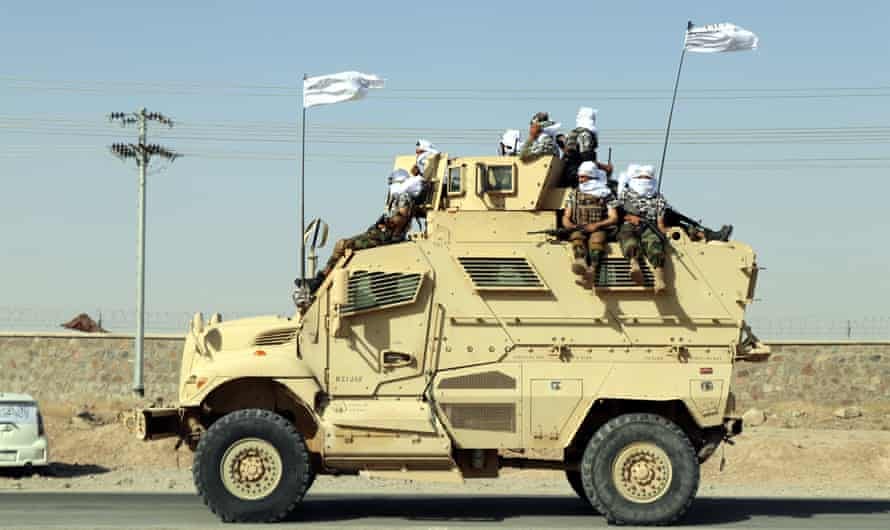As the American public and the broader Western world watched the last US troops depart Afghanistan a curious pattern emerged. A non-negligible percentage of Westerners, particularly men, tuned in to reports of the Taliban’s capture of US weapons systems, parading around in MRAPs and posing for pictures in front of abandoned C-130s, with a kind of perverse glee. The Taliban was supposed to be the sworn enemy of everything good and holy in the world, a backwards force for pure evil that America had done battle with for two decades. Why was it that now, at the close of a humiliating war, a small subset of the American public actually seemed to revel in the defeat? Why were these Romans cheering on Attilla’s hordes as he despoiled their garrisons on the far-flung hinterlands of the Empire?
Mainstream news outlets have also picked up on this phenomenon. CNN tells us that US officials are already concerned about “White supremacist praise of the Taliban” whereas Politico Europe claimed that Western far-right groups are “claiming the Taliban victory as their own.” Something strange is afoot here, and even mainstream journalists are cottoning on. There has undoubtedly emerged a strange dynamic in the Western world whereby a non-negligible subset of the population derives pleasure from seeing the US, leader of the free world, humiliated by the Taliban. My desire as an independent journalist is not to shame but to ask: what possible reason could these people have for admiring the Taliban?
While there are some that flirt with outright support of the Taliban and everything they do, including horrendous crimes against women and children that cannot and should not be papered over, I think the vast majority of those in this “mindspace” we have described know full and well that the Taliban are a brutal and violent group of marauders. It is less that they love the Taliban but that they, paradoxically, love America. For those who don’t yearn for White Sharia but nevertheless look on with a kind of smug satisfaction as the disintegration of the US’s imperial project in Afghanistan, the roots of their “treachery of sentiment,” so to speak, are found entirely in America.
First, it was the State and Defense apparatuses here in the homeland that wore out the term “terrorist” until it came to mean nothing other than “someone who disagrees with us.” Vast swaths of the electorate came to be identified with the nebulous term “potential domestic terror threats.” If “terrorist” over here means an anti-establishment dissident, what does the US government really mean when they say the Taliban are terrorists?
Second, it was the exportation of certain noxious and by no means “democratic” social conventions to Afghanistan by the United States that created a kind of quasi-fellowship with the Pashtuns fighting to overturn imperial rule. Americans subjected to the regime of Diversity, Equity, and Inclusion here at home watched as the Rorschach blot that was the invasion of Afghanistan slowly morphed into a project to secularize and feminize the country. By the time of the Fall of Kabul, it became clear that the US military’s project in the country, if it ever had a clearly defined goal, was to defend this nascent bastion of Afghan-flavored cultural sterility. In other words, US dissidents saw what Washington was propping up in Afghanistan and it looked a hell of a lot like what they were being subjected to at home. The only difference was that the Taliban, personally reprehensible as they might be, had a chance of fighting back.
Finally, it is my opinion that Americans are more than ever aware of their subjugation at the hands of a hostile ruling class. When the first flag-draped coffins came back from Afghanistan, patriotic Americans could take solace in the fact that they had been doing their duty and protecting their countrymen. Now, the US military looks more and more like a mercenary force, and one well-attuned to the platitudes of the ruling classes that have feminized and deracinated every other social institution in the United States. In the Taliban, Americans see strength, virility, and (what is more) actual and sincere belief in a cause, even if that cause is odious. They see an inverted picture of what America might have been 20 years ago, should be, but probably never will be again.
And in the parade of humiliation, somewhere, I feel, is a hope. There is a hope that this cacophony of images of the imperial borders melting before the Huns will hasten the decline of the malefactors that rule over them. The comparison between Americans and Romans is not quite apt because Americans never asked for, wanted, or particularly care to have an empire. The collapse of these foreign entanglements also signals the first slow steps towards a return to the land we once were and the one many dissidents long for us to be: that Jeffersonian republic that tends to its own peoples, its own traditions, and its own borders. Perhaps it is not a hope well-founded, but it is one nonetheless.




